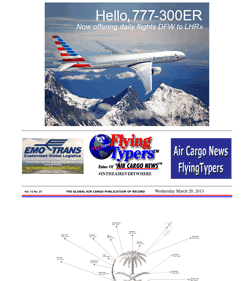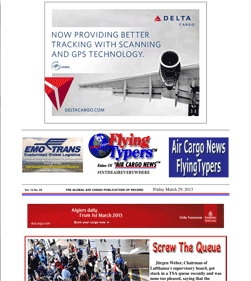 |
 |
|
| |
||
|
Vol. 11 No. 30 #INTHEAIREVERYWHERE Thursday April 4, 2013 |
 |
 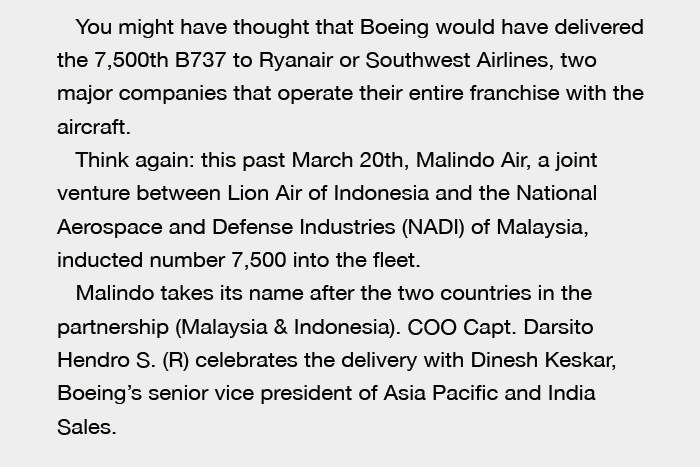
|
|
|
(Lisbon
Exclusive)—We
attended the Annual General
Meeting of EMO Trans in Lisbon,
which occurred hot on the heels
of IATA WCS in Doha. IATA WCS
was full of big thoughts and
sky-high sessions and speeches,
but speaking with busy Joachim
(Jo) Frigger, CEO, EMO, what
is most compelling is the direct
hands-on attitude. |
 |
|
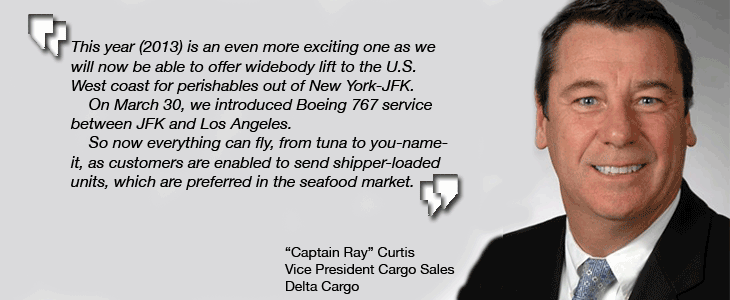 |

“Delta
Cargo is of course well-known
throughout the industry as a
major shipper of perishables
such as fresh and frozen seafood
around the world.
“The
annual Boston Seafood Show is
a prime opportunity for us to
meet face-to-face with our customers
from around the industry.
“The
show provides an unequalled
venue to promote our worldwide
network and global reach, which
is expanded even further by
our North American joint venture
partners Air France, KLM, and
Alitalia.

“Shipping
perishables such as seafood
is major business for Delta,
and we have a special focus
this year to grow our high-value
product lines, like perishables.
“The
seafood market has been in continuous
expansion recently.
“During
the past three years we have
seen noticeable growth in seafood
shipments from the U.S. to Asia
and from Latin America into
the U.S.
“This
year (2013) is an even more
exciting one as we will now
be able to offer widebody lift
to the U.S. West coast for perishables
out of New York-JFK.
“On
March 30, we introduced Boeing
767 service between JFK and
Los Angeles.
“So
now everything can fly, from
tuna to you-name-it, as customers
are enabled to send shipper-loaded
units, which are preferred in
the seafood market.”

“We
have defined clear operational
procedures for our teams that
outline the handling of seafood
and other perishable items.
“Shipments
are accepted and set to ride
as booked.
“Delta
assigns perishables a higher
boarding priority because of
the nature of the product.
“If
the shipment doesn’t ride
as booked for any reason, we
bring it back to the warehouse
for storage in coolers whenever
possible, depending on the city,
or we hold it in the warehouse
protected from the elements
until it is able to ride on
the next available flight.”

“This
was our 25th year of participation
in the Boston Seafood Show.
“We
greeted more than 19,000 visitors
from 100 countries.
“Attendees
include seafood buyers, sellers,
and logistics forwarders.
“We
are fortunate to have account
manager Christine Waggett on
the team, who has been with
Delta Cargo Sales in Boston
for more than 25 years and at
the show every year.
“She
and our operational staff, led
by our manager of Cargo Operations,
Tom Perrotta, are dedicated
to ensuring that we offer a
consistent level of service
and operational excellence out
of Boston.
“The
show allows us to promote our
markets and service.
“Most
of the actual business is booked
after the fact.
“Customers
establish a Delta Cargo point
of contact during the show,
and we follow up with calls
and create the relationship
to help them book and ship.
“After
customers attend the show, they
leave with a better knowledge
of how we move perishable shipments.
“We
can also introduce them to our
dedicated website, deltacargo.com,
and familiarize them with our
Customer Service Center.
“This
year Delta delivered ‘More
Cargo to More of the World’
was our message in Boston.
“It
was a great place to be,”
Captain Ray assures.
Geoffrey/Flossie
 |
|
|
FreightWatch
International’s
(FWI) 2012 US Cargo Theft Report
said that the U.S. pharmaceutical
industry suffered 30 major cargo
thefts during the year, with
an average loss of $168,219.
|
Transported
Asset Protection Association
(TAPA) reports
a significant increase in Europe
of truck theft incidents in
which thieves utilize high-tech
jamming devices to block the
electronic signal of keys as
a driver attempts to lock down
his vehicle.
The
remote manipulation occurs utilizing
a device easily purchased via
the Internet at a cost of less
than 100USD, which “prevents
the vehicle from locking down,
and it happens completely unnoticed
by the driver,” TAPA said.
Once
inside, the thieves access the
computer system and, using a
second electronic device (also
available on the internet),
reprogram a blank key to start
the vehicle, all in a matter
of minutes.
Separately,
The London Daily Telegraph
reported that more than 1,000
high-performance cars across
the UK were stolen using this
method in the past year.
After reports that cargo terminals at major Indian airports could be attacked by terrorists amidst increasing cargo and baggage theft, operations at eight major subcontinent airports (including Delhi and Mumbai, which were being guarded by Airport Authority of India (AAI)) are now under supervision of India’s Central Industrial Security Force (CISF).
UN sanctions set to go in effect against the Democratic People’s Republic of Korea include inspections of air & sea cargo on the way to or from North Korea, with proviso that if the crew of a ship or aircraft rejects a request for inspection, the UN member-state can bar any further company movements altogether. The resolution drafted by the U.S. and Chinese delegations provides for toughening sanctions against North Korea in retaliation for the nuclear test that Pyongyang conducted in February.
Get
On Board Air Cargo News
FlyingTypers |
|
If
You Missed Any Of The Previous
3 Issues Of FlyingTypers |
|||||
|
|||||
FT032013 |
FT032913 |
||||
|---|---|---|---|---|---|

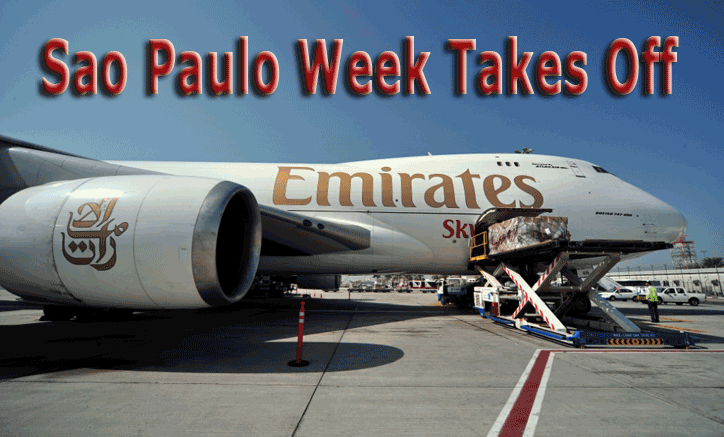


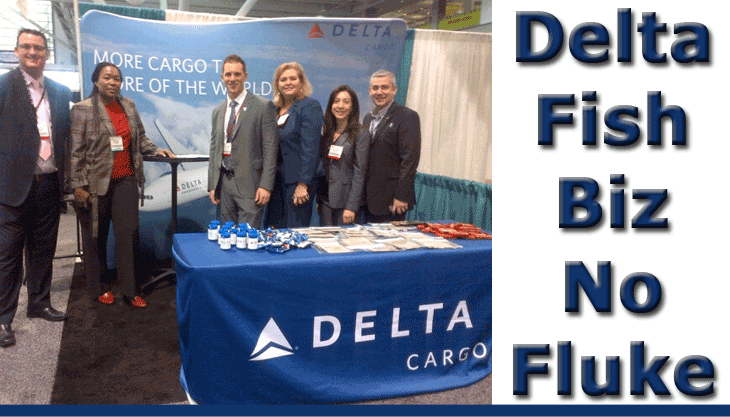
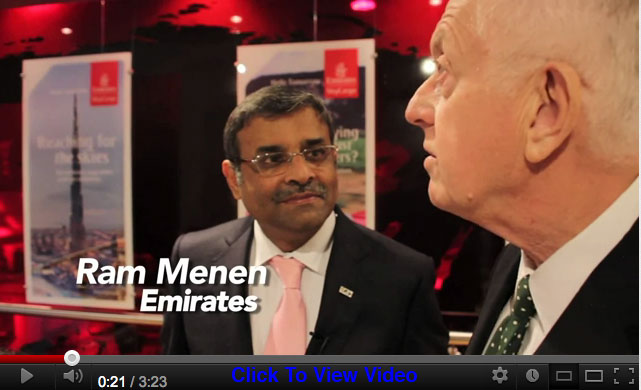
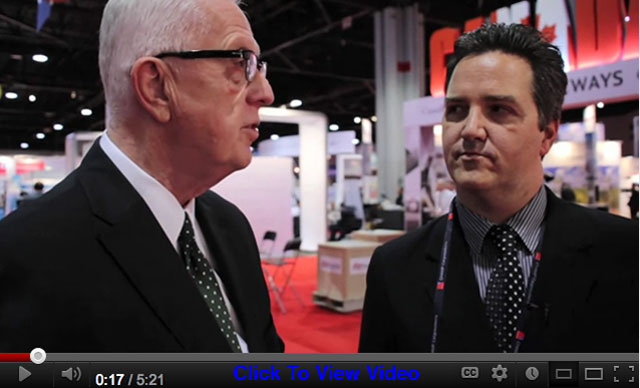

 RE:
RE:
